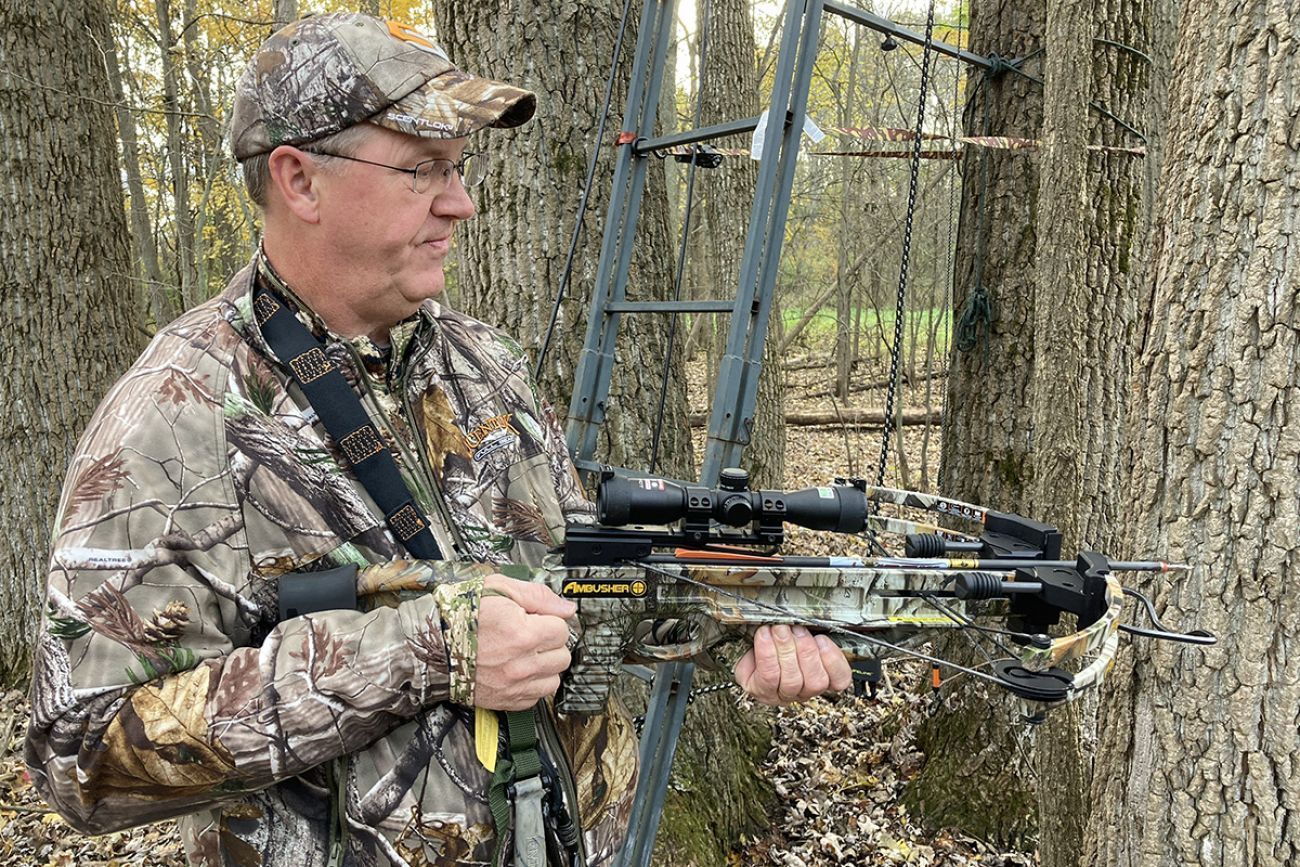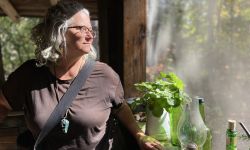Five reasons why Michigan deer herds are surging: hunting declines are just one

- Michigan’s deer population has grown to about 2 million, big enough to become a nuisance in southern Michigan
- Declining hunting participation is the biggest factor in Michigan’s deer invasion, but not the only one
- Climate change, sprawl, hunter habits, a decline of predators and a lack of accessible hunting land all play a role
During a recent interview with Bridge Michigan about the state’s troublingly-large deer herd, Amy Trotter stumbled directly into a root cause of the problem.
Trotter, who leads a hunting advocacy group called the Michigan United Conservation Clubs, had taken a call while walking the group’s wooden 4-acre property just outside Lansing.
“No one would be allowed to hunt back here,” Trotter said, explaining that township ordinance forbids it. “But I’ve walked up on three does and two turkeys while I’ve been talking with you.”
Related:
- As hunting wanes, fear of a southern Michigan deer invasion grows
- Firearm deer hunting season starts Wednesday in Michigan: What to know
Prohibitions on shooting rifles or bows in some jurisdictions are one in a long list of factors contributing to Michigan’s deer invasion.
The hoofed vegetarians are gentle and often beautiful. But affection for deer is wearing thin across lower Michigan as they gobble up corn crops and gardens, spread disease and increase automobile collision rates.
Bridge has reported extensively about the effort to shrink Michigan’s herd of 2 million deer. State and local officials have tried everything from removing ovaries and enlisting sharpshooters to begging recreational hunters to shoot more does.
But no single policy can reverse a population boom caused by longstanding land use trends, wildlife management priorities and waning interest in hunting.
Finding good solutions requires an understanding of the problem. Here’s a primer on how Michigan’s deer herd got so big, in the first place.
Fewer hunters
Perhaps the biggest cause of deer overpopulation is that there simply aren’t enough hunters in Michigan.
At the turn of the millennium, there were about 800,000 deer hunters in Michigan. That’s down to about 540,000 today, and another 100,000 will likely hang up their rifle within the next decade.
“There seems to be some sort of a cultural shift going on,” said Chad Stewart, deer, elk and moose management specialist for the Michigan Department of Natural Resources.
The average Michigander’s lifestyle has changed dramatically in recent decades. Fewer people live in rural areas where hunting is accessible. Supply chains have evolved, and fewer people may view hunting as crucial to feeding their families. And other recreational pursuits, from video games to mountain biking to club sports, are winning the competition for younger generations’ free time.
With fewer hunters in the woods, the department has tried to encourage those that remain to shoot more deer per person. But though it’s legal to shoot up to 12 deer in a single season, most people bag just one.
“They get their buck, and then they’re done,” said Sonja Christensen, a deer expert and assistant professor in the Michigan State University Department of Fisheries and Wildlife.
Sprawl
Michigan’s population has been stagnant for the past 20 years, but the push for housing continues into forests and farm fields.
That development has gobbled up natural deer habitat, pushing the animals closer to humans, further out-of-reach of hunters, and into developed landscapes where corn crops and vegetable gardens provide ample food.
This combination of agriculture and suburbs makes southern Michigan ideal for deer, Stewart said.
“If you were to draw a straight line south of Saginaw Bay, and include the Thumb, everything below that is our most populous counties for deer,” Stewart said.
Finding open space large enough to legally hunt in the suburbs is difficult, so the deer proliferate. Michigan several years ago sought to address this problem by making it legal to hunt with bow-and-arrow at close range. But local governments often still prohibit the practice.
“We've been picking away at these barriers as we go,” Trotter said.
Antler obsession
Hunter habits also play a role.
State wildlife officials say the best way to slow population growth is by killing more does, thereby preventing them from giving birth the following spring. But Michigan hunters have instead grown more preoccupied with shooting bucks.
As Bridge has reported, Michigan is the only Great Lakes state where hunters shoot more bucks than does. And the gap is growing wider. Why?
“You just have to look at the top of the deer’s head,” Stewart said. “The antlers are prominently displayed, and especially if it’s a large set, it’s viewed as a trophy.”
With so few hunters in the woods today, Christensen said Michigan’s herds would likely keep growing even if more hunters targeted does. But that population growth “certainly would slow down,” she said.
Land access issues
With deer herds expanding primarily in the southern Lower Peninsula, hunters often have difficulty finding a place to legally shoot them.
The vast majority of Michigan’s publicly-accessible hunting land is in the northern Lower Peninsula and Upper Peninsula. The deer-filled southern Lower Peninsula, though, is dominated by private land.
That lack of public access, Trotter said, is “a really hard thing to overcome.”
Michigan once attempted a state-sponsored matchmaking system to connect hunters with private landowners willing to allow hunting on their property. It was a bust. Thousands of hunters participated, but only a handful of landowners.
The state now runs a program that pays landowners to allow hunters on their land. But interest in that program has been low, too.
“They don't want to interfere with their brother-in-law's chance to take a deer by letting some stranger walk onto their land,” Trotter said. “To some extent, it’s understandable…but it’s certainly adding to the overall problem.”
What’s more, Trotter said, Michiganders living in urban and suburban spaces may lack the space and tools to butcher a deer, even if they had an opportunity or desire to shoot one.
“For someone who lives in a subdivision, when they shoot a deer, what do they do with it?” Trotter said, adding that “we have fish-cleaning stations (at parks across Michigan). Maybe we need to look at deer-cleaning stations.”
Predator suppression and climate change
Aside from human hunters, predators and harsh winters are the two biggest threats to deer survival.
But humans long ago eradicated wolves and cougars from most of the state. Other predators, such as bears and bobcats, are also relatively rare in southern Michigan. That leaves deer with few natural predators.
And climate change is making winters warmer and shorter, which means deer are less-likely to succumb to cold-weather starvation.
“If the limits have been removed, which deer have otherwise evolved with, they will keep growing,” Christensen said. “White-tailed deer are very good at making more white-tailed deer.”
So, what will it take to get deer populations under control? Stewart, of the DNR, said Michigan needs to kill tens of thousands more deer annually.
It’s unclear whether hunters alone can make that happen, raising the possibility that hired sharpshooters or commercial hunters could become a bigger part of the state’s deer management landscape.
Stewart said Michigan isn’t actively considering opening Michigan up to commercial deer hunting. But if deer populations continue to grow out of control, he said, “we're doing the species a disservice if we're not turning over every stone to find a healthy balance.”
Michigan Environment Watch
Michigan Environment Watch examines how public policy, industry, and other factors interact with the state’s trove of natural resources.
- See full coverage
- Subscribe
- Share tips and questions with Bridge environment reporter Kelly House
Michigan Environment Watch is made possible by generous financial support from:
Our generous Environment Watch underwriters encourage Bridge Michigan readers to also support civic journalism by becoming Bridge members. Please consider joining today.
See what new members are saying about why they donated to Bridge Michigan:
- “In order for this information to be accurate and unbiased it must be underwritten by its readers, not by special interests.” - Larry S.
- “Not many other media sources report on the topics Bridge does.” - Susan B.
- “Your journalism is outstanding and rare these days.” - Mark S.
If you want to ensure the future of nonpartisan, nonprofit Michigan journalism, please become a member today. You, too, will be asked why you donated and maybe we'll feature your quote next time!






